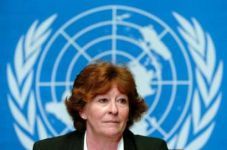UN agencies should increase staff in Darfur, human rights chief says
GENEVA, Sep 28, 2004 (AP) — The U.N. should boost staff numbers in Sudan ‘s embattled Darfur region to help protect the area’s refugees, the world body’s human rights chief said Tuesday.
 Louise Arbour, U.N. High Commissioner for Human Rights, told reporters on her return from a seven-day visit to Darfur that she would recommend the increase to Secretary-General Kofi Annan.
Louise Arbour, U.N. High Commissioner for Human Rights, told reporters on her return from a seven-day visit to Darfur that she would recommend the increase to Secretary-General Kofi Annan.
“I will be advocating as forcefully as I can the need for an expansion of the international presence on the ground,” Arbour said. “There are still very serious violations of human rights.”
The U.N. has called the situation in the western Darfur region the world’s worst humanitarian crisis.
There are currently around 500 international staff in Darfur, working for the U.N. and other relief organizations. The U.N. couldn’t give an exact figure for its number of staff in Darfur, as the number “changes all the time,” Arbour’s spokesman Jose Diaz said.
Arbour wants to see the number “massively increased,” Diaz said. Arbour wasn’t specifically calling for U.N. peacekeepers to be deployed, he noted.
Last week, the 53-nation African Union said it is ready to move thousands of troops to Darfur, provided Western nations and the U.N. give logistical support. The U.N. Security Council has called for the African Union to vastly increase the number of troops it has there, now numbering about 300, to try to prevent attacks by Arab militias against black Africans.
About 1.2 million people in Darfur – a region about the size of France – have fled their villages because of attacks blamed on government-backed militias, known as the Janjaweed. More than 200,000 have crossed to neighboring Chad.
Sudan , under threat of U.N. sanctions, insists it is now doing all it can to calm the situation and says it is ready to welcome home uprooted non-Arab African villagers.
But Arbour said the main threat to security in Darfur is the attitude of the Sudanese government, which she accused of not doing enough to protect the region’s African population.
“The core crisis is one of safety and security and is one we must address with great urgency,” she explained. “The very best protection for people on the ground … would be an attitude by the government … that acknowledged the severity of the crisis.”
In particular, the government is telling refugees it is safe to return to their homes, but is failing to provide adequate protection. Refugees are “invariably attacked” when they leave the camps, and their attempts to report Janjaweed violence lead nowhere, Arbour said.
But Arbour stressed that it is difficult to characterize the nature of the violence in Darfur, saying that “frankly it’s a matter of little importance to the victims.”
The U.S. and some aid groups say genocide has already been committed in Darfur, a charge the government denies. The violence broke out with the emergence of two rebel groups after February 2003.
“At this stage, in my view it’s premature (to give) a definitive labeling” of whether Darfur’s people face genocide, Arbour added.
Arbour’s eight-member delegation visited towns and camps across Darfur before returning to Khartoum for meetings with government officials. “There is a very profound sense of insecurity and fear among the (refugees) that are in camps,” Arbour said. “The only comfort … that they develop is when they feel that the world is watching.”ldcard Novak Djokovic
